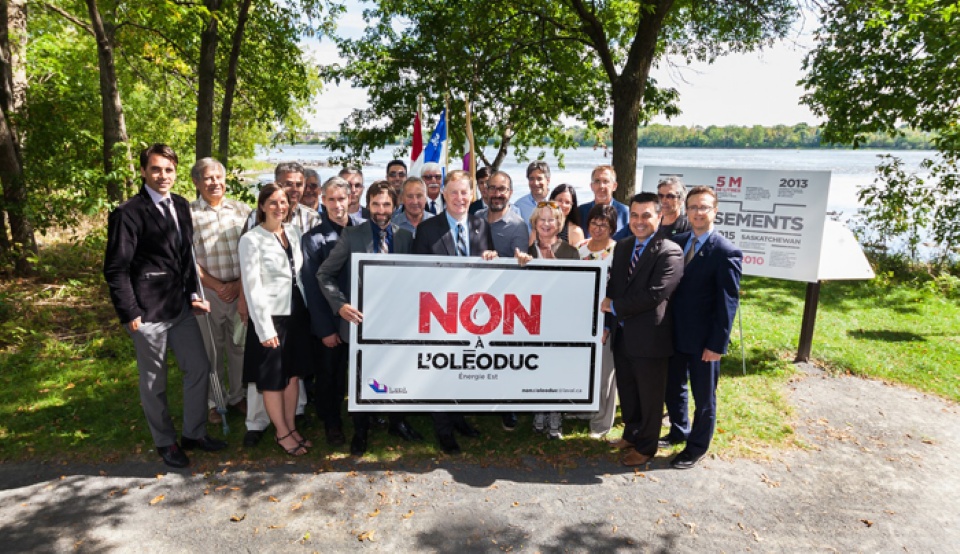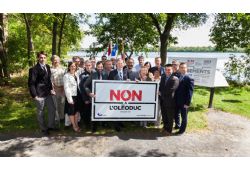Laval Mayor Marc Demers proudly displays pictures of his six healthy grand kids on his desk at City Hall. He is grateful to be a grandfather; the photos of their little faces make him smile. A former cop, Demers understands all too well that life is fragile. He’s seen more than his fair share of death and destruction while serving in the police force. His instinct is to protect his family, his community and its citizens.
So when the TransCanada Corporation proposed running part of its oil pipeline through the eastern end of Laval, Demers was worried.
Demers explained in an official press release issued last September, “Our main concern is our residents’ safety and environment protection, and in particular, with regard to the risk of spills in our rivers.”
Since issuing the press release, Demers continues to remind the public that Laval supports a vision based on “sustainable development, a reduction in greenhouse gases and a reduction in the dependency on motor vehicles… [and] on active mobility of residents”.
If approved by the federal government, the Energy East pipeline project would see the development and creation of a 4,600-km pipeline transporting roughly 1.1 million barrels of crude oil per day from Alberta and Saskatchewan to refineries and port terminals in Eastern Canada by 2020.
Laval city officials met with the TransCanada Corporation in August of 2015 to understand the scope of the project.
“During the meeting with the representatives from the Energy East project, there were many answers they gave us that left a bitter taste in my mouth,” said Demers.
The mayor did his due diligence, hiring an external firm to complete an analysis of the project. “Having been elected, the citizens of Laval put at my disposal… a budget to have access to resources, scientists and specialists for when a situation like this arises.”
Demers stated the external firm concluded the project posed major risks, particularly since it is slated to run through the city’s water supply.
“What happens if these products get into our water filtration plants? We can’t put access to our water in jeopardy,” Demers pointed out.
The mayor admitted Laval is already at risk because of existing pipelines running through the city, as well as oil transported via trains. “We can’t change that,” he explained. “But why increase our risk?”
Demers made headlines back in September of 2015 after formally rejecting the project and urging Laval citizens and other municipalities to follow suit. Laval residents listened, with nearly 3,000 joining 90,000 other Quebecers in signing a petition against the pipeline.
“I have taken a clear stance,” said Dsmers. “If there are other municipalities that want to join us, we have made our research and our studies available.”
Tim DuBoyce, spokesperson for TransCanada, says the provincial government is going to carry out its own review of the Quebec portion of the project sometime in early 2016. The company expects the National Energy Board will begin its hearing process in 2016, with its final recommendation made to the federal government by 2017, when construction is slated to begin.
“We hope to continue our dialogue and our engagement with the mayor and the councilors in Laval. We've had a number of meetings with them already to discuss the project, hear their questions and their concerns and try to address those issues as best as we possible can,” said DuBoyce.
DuBoyce repeated that pipelines “demonstrated to be the safest way to move that oil that we all need”.
“Whether it’s your tablet, your smart phone, the soles of your shoes, your clothing, hockey pucks, medical supplies—these things are all made with oil. I think people forget that,” maintained DuBoyce.
Anthony Mancini and his wife, Elena Catania moved to Laval four years ago. They have two young daughters under the age of three. Both parents are opposed to the pipeline project.
“I love Laval. You have a bit of the country mixed in with the city life,” said Mancini. “If they’re going to start putting more pipelines through, I would see it as a threat to the charm of the city.”
Mancini agrees our economy relies on oil, but believes our efforts and money should be invested in eco-friendly, renewable energy.
Catania wants to guarantee her children will continue to have clean drinking water and uncontaminated soil. She thinks the pipeline would put that at risk.
“Even if there’s only a 0.01<>percentage<> chance that the kids can get sick then that’s enough for me to say the [pipeline] is not worth it,” said Catania.
“I want my kids to be healthy and live longer. More people are getting lung cancer. I don’t want them to be affected by contaminated air or water,” Mancini added.
A greener Laval
Many Laval
residents agree with Mancini and Catania. More than 3,000 citizens took part in
a public consultation early in 2015 to discuss the future of their city.The consensus was a greener, healthier Laval.
Several
projects are in the works based partly on the results of the consultation, according
to Demers.
Laval’s
woodlands are protected and several more wooded areas will be planted.
A bike path
expansion is in the works. Existing bike paths will intersect and several more will
be added, making it possible to bike across the entire island. Eventually, the mayor wants to encourage employers
to use incentives to get employees to pedal to work.
Improving bus
service is a priority as well. The goal would be to reduce the number of cars
on the road.
Moreover, a new
park adjacent to Cité de la Santé Hospital is planned. This outdoor gym would
be for patients to use as part of their healthcare routine, and would be
accessible to all residents looking to exercise and take in some fresh
air.
“As a society, investing in oil is a mistake,” concludes Demers. “We need to promote healthy living.”

 In The Latest Issue:Latest Issue:
In The Latest Issue:Latest Issue:
- A Bittersweet Farewell
- The new Laval Aquatic Co...
- The End of an Era:
Articles
Calendar
Virtual- ANNUAL TEACHER APPRECIATION CONTEST
- APPUI LAVAL
- ARTS & CULTURE
- CAMPS
- CAR GUIDE
- CCIL
- CENTENNIAL ACADEMY
- CHARITY FUNDRAISING
- CITYTV
- COSMODÔME
- COMMUNITY CONNECTIONS
- COVER STORY
- DINA DIMITRATOS
- ÉCOLE SUPÉRIEURE DE BALLET DU QUÉBEC
- EDITORIALS
- ÉDUCALOI
- EDUCATION
- EMPLOYMENT & ENTREPRENEURSHIP
- FÊTE DE LA FAMILLE
- FÊTE DU QUARTIER SAINT-BRUNO
- FAMILIES
- FESTIVAL LAVAL LAUGHS
- FÊTE DE QUARTIER VAL-DES-BRISES
- FINANCES
- GLI CUMBARE
- GROUPE RENO-EXPERT
- HEALTH & WELL-BEING
- 30 MINUTE HIT
- ANXIETY
- CHILDREN`S HEALTH & WELLNESS
- CLOSE AID
- DENTAL WELLNESS
- EXTREME EVOLUTION SPORTS CENTRE
- FONDATION CITÉ DE LA SANTÉ
- GENERAL
- HEARING HEALTH
- MESSAGES FROM THE HEALTH AGENCY OF CANADA
- MENTAL HEALTH
- SEXUALITY
- SOCIAL INTEGRATION
- SPECIAL NEEDS
- TEENS
- THE NUTRITION CORNER
- THE NUTRITION CORNER - RECIPES
- VACATION DESTINATION
- WOMEN'S FITNESS
- WOMEN'S HEALTH
- HILTON MONTREAL/LAVAL
- HOME & GARDEN
- INTERNATIONAL WOMEN'S DAY
- JAGUAR LAVAL
- LAVAL À VÉLO
- LAVAL FAMILIES TV SHOW
- LAVAL FAMILIES MAGAZINE CARES
- LAVAL URBAN IN NATURE
- LE PARCOURS DES HÉROS
- LES PETITS GOURMETS DANS MA COUR
- LEON'S FURNITURE
- LEONARDO DA VINCI CENTRE
- LFM PREMIERES
- LIFE BALANCE
- M.P. PROFILE
- MISS EDGAR'S AND MISS CRAMP'S SCHOOL
- MISSING CHILDREN'S NETWORK
- NETFOLIE
- NORTH STAR ACADEMY LAVAL
- OUTFRONT MEDIA
- PASSION SOCCER
- PARC DE LA RIVIÈRE-DES-MILLE-ÎLES
- PÂTISSERIE ST-MARTIN
- PIZZERIA LÌOLÀ
- PLACE BELL
- PORTRAITS OF YOUR MNA'S
- ROCKET DE LAVAL
- SACRED HEART SCHOOL
- SCOTIA BANK
- SHERATON LAVAL HOTEL
- SOCIÉTÉ ALZHEIMER LAVAL
- STATION 55
- STL
- SUBARU DE LAVAL
- TECHNOLOGY
- TEDXLAVAL
- TODAY`S LAURENTIANS AND LANAUDIÈRE
- TODAY`S LAVAL
- WARNER MUSIC
- THIS ISSUE
- MOST RECENT
Magazine
City takes a stand against Energy East pipeline, opts for a greener future
Articles ~e 105,7 Rythme FM 4 chemins Annual Teacher Appreciation Contest Appui Laval Arts & Culture Ballet Eddy Toussaint Camps THIS ISSUE MORE...
CONTESTS Enter our contests
CONTESTS Enter our contests
CALENDAR
Events & Activities
COMMUNITY Posts Events
PUBLICATIONS Our Magazine Family Resource Directory
LFM BUSINESS NETWORK Learn more
COUPONS Click to save!
COMMUNITY Posts Events
PUBLICATIONS Our Magazine Family Resource Directory
LFM BUSINESS NETWORK Learn more
COUPONS Click to save!
SUBSCRIPTIONS
Subscribe to the magazine
Un-Subscribe
E-NEWSLETTER Subscribe to our E-newsletter Un-Subscribe
WRITE FOR US Guidelines & Submissions
POLLS Vote today!
E-NEWSLETTER Subscribe to our E-newsletter Un-Subscribe
WRITE FOR US Guidelines & Submissions
POLLS Vote today!
ADVERTISERS
How to & Media guide
Pay your LFM invoice
SUGGESTIONS Reader's Survey Suggest a Listing
LFM About Us Our Mission Giving Back Contact Us
SUGGESTIONS Reader's Survey Suggest a Listing
LFM About Us Our Mission Giving Back Contact Us
 PICK-UP LOCATIONS
Get a copy of LFM!
PICK-UP LOCATIONS
Get a copy of LFM!
TERMS & CONDITIONS Privacy | Terms
ISSN (ONLINE) 2291-1677
ISSN (PRINT) 2291-1677
Website by ZENxDESIGN




 BY:
BY: 
Tweet
Share